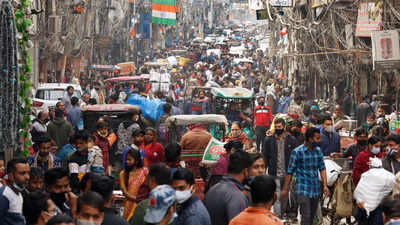- News
- India News
- Third wave: Delhi may see Covid-19 peak of 50,000-60,000 daily cases in a week’s time, Mumbai to touch 30,000
Trending
This story is from January 9, 2022
Third wave: Delhi may see Covid-19 peak of 50,000-60,000 daily cases in a week’s time, Mumbai to touch 30,000
The Covid-19 third wave peak in India is expected to arrive at the end of this month with daily cases of four to eight lakh (seven-day average) and the peak in Delhi and Mumbai are expected around mid-January with daily cases of 50,000-60,000 and 30,000 odd cases (seven-day average), respectively, said IIT Kanpur professor Manindra Agrawal, who is leading the government's backed Sutra model to mathematically predict the spread of the virus, on Sunday.

NEW DELHI: The Covid-19 third wave peak in India is expected to arrive at the end of this month with daily cases of four to eight lakh (seven-day average) and the peak in Delhi and Mumbai are expected around mid-January with daily cases of 50,000-60,000 and 30,000 odd cases (seven-day average), respectively, said IIT Kanpur professor Manindra Agrawal, who is leading the government's backed Sutra model to mathematically predict the spread of the virus, on Sunday.
The model has always indicated that the fall would also be sharper in cases of sharper rise in number of cases - it means the number of cases would fall quickly once the country as a whole and cities reach their respective peaks.
Covid in India live updates
Agrawal, however, said the Sutra model at present does not have "precise data" on the third wave to be able to make accurate predictions for India as a whole. "Doing prediction for India at the moment is more difficult since the model has not been able to capture the present phase yet," Agrawal tweeted two days ago.
On Sunday, he said, "We will have to wait for three-four days until we can give a more precise prediction (on India's peak)." But, he appears to be more confident on peak prediction for Delhi and Mumbai which may happen one week from now. "The (Sutra) model has the more precise answer for these two cities," he said.
"Overall, this wave appears manageable due to low hospitalization rates. Of course, things could change in the next couple of weeks. Also, there may be a localized shortage of beds. So proper care and planning is warranted," tweeted Agrawal, noting that the bed requirement could peak around 1.5 lakh at all-India level whereas it could be "less than 12,000" in Delhi.
The professor does not see any direct link between the rise in cases and election rallies. Referring to a study of past elections during the pandemic phase, he said that the election rally was only one of the many things that had caused the wave to spread. "What is needed is not to focus on one thing but to have focus across the board," said Agrawal.
The model has always indicated that the fall would also be sharper in cases of sharper rise in number of cases - it means the number of cases would fall quickly once the country as a whole and cities reach their respective peaks.
Covid in India live updates
Agrawal, however, said the Sutra model at present does not have "precise data" on the third wave to be able to make accurate predictions for India as a whole. "Doing prediction for India at the moment is more difficult since the model has not been able to capture the present phase yet," Agrawal tweeted two days ago.
On Sunday, he said, "We will have to wait for three-four days until we can give a more precise prediction (on India's peak)." But, he appears to be more confident on peak prediction for Delhi and Mumbai which may happen one week from now. "The (Sutra) model has the more precise answer for these two cities," he said.
"Overall, this wave appears manageable due to low hospitalization rates. Of course, things could change in the next couple of weeks. Also, there may be a localized shortage of beds. So proper care and planning is warranted," tweeted Agrawal, noting that the bed requirement could peak around 1.5 lakh at all-India level whereas it could be "less than 12,000" in Delhi.
The professor does not see any direct link between the rise in cases and election rallies. Referring to a study of past elections during the pandemic phase, he said that the election rally was only one of the many things that had caused the wave to spread. "What is needed is not to focus on one thing but to have focus across the board," said Agrawal.
End of Article
FOLLOW US ON SOCIAL MEDIA











